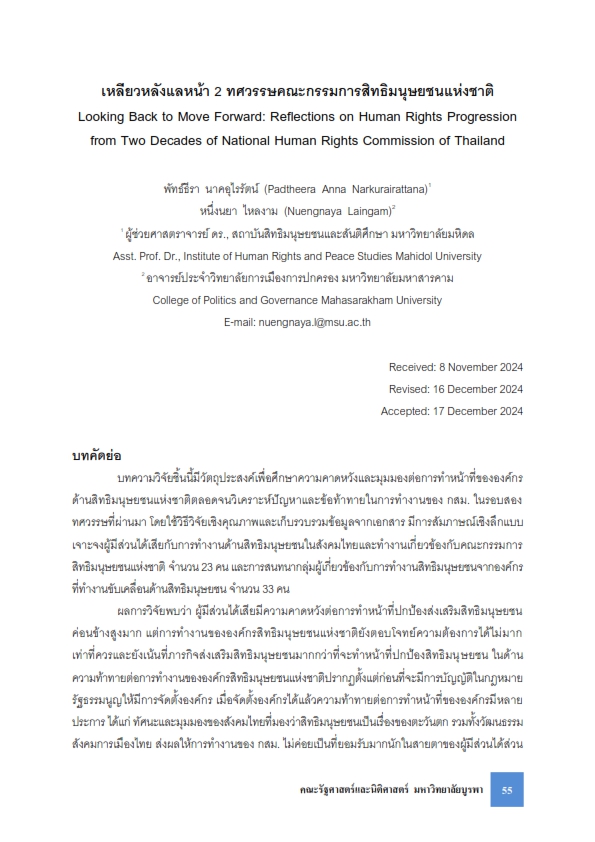Looking Back to Move Forward: Reflections on Human Rights Progression from Two Decades of National Human Rights Commission of Thailand
Keywords:
National Human Rights Commission of Thailand (NHRC), Human Rights, Paris Principle, Political RightsAbstract
This research article aims to study the expectations and perspectives regarding the role of the National Human Rights Commission (NHRC), as well as to analyze the problems and challenges faced by the NHRC over the past two decades. A qualitative research method was employed, collecting data from documents and conducting: 1) in-depth interviews with 23 stakeholders involved in human rights work in Thai society and related to the NHRC, and 2) focus group discussions with 33 individuals from organizations working to promote human rights.
The research findings indicate that stakeholders have very high expectations for the role of protecting and promoting human rights. However, the work of the NHRC has not sufficiently met these needs, focusing more on promoting human rights rather than protecting them. Challenges faced by the National Human Rights Organization have been apparent since before the establishment of the organization under constitutional law. After its establishment, various challenges arose, including societal views that perceive human rights as a Western, and the cultural and political environment in Thailand that poses significant obstacles. As a result, the work of the NHRC is perceived as slow and ineffective in protecting civil rights, described as a paper tiger. There is also a lack of communication with the public to raise awareness of its work in protecting and promoting human rights. The research further found that the public expects the NHRC to serve as a facilitator to coordinate between agencies, opening spaces to empower citizens and becoming more of a refuge for the public than it currently is. In addition, a significant challenge faced by all four NHRC committees was dealing with the non-democratic political environment in Thailand over the past 20 years, marked by repeated coups and constraints on their independence in carrying out their duties.
References
รายการอ้างอิง
กนกวรรณ เกิดผลานันท์. (2567). เปิดเหตุผลไทยสมัครคณะมนตรีสิทธิมนุษยชนยูเอ็น ยกระดับการพัฒนาสู่เวทีโลก. กรุงเทพธุรกิจออนไลน์. วันที่ค้นข้อมูล 23 ตุลาคม 2567, เข้าถึงได้จากhttps://www.bangkokbiznews.com/world/1144531?fbclid=IwY2xjawGFdzpleHRuA2FlbQIxMQABHWtNoju4mHdzi5GmHdFfQ0Gh6V7_mYMvCB-DzKe5IoSEloes9w5JYl5P1g_aem_vciJMy5mA08lwMFyDiS0ug#google_vignette
กรมองค์การระหว่างประเทศ. (2567). ไทยกับสหประชาชาติ. วันที่ค้นข้อมูล 27 ตุลาคม 2567, เข้าถึงได้จาก
https://thai-inter-org.mfa.go.th/th/page/72184-ไทยกับสหประชาติ?menu=5d8477eb182d956ee700c670#
กระทรวงการต่างประเทศ. (ม.ป.ป.(ก)). กระบวนการ UPR รายงานประเทศ. วันที่ค้นข้อมูล 27 ตุลาคม 2567, เข้าถึงได้จาก https://humanrights.mfa.go.th/th/upr/report-3/
กระทรวงการต่างประเทศ. (ม.ป.ป.(ข)). ปฏิญญาสากลว่าด้วยสิทธิมนุษยชน - Universal Declaration of Human Rights. วันที่ค้นข้อมูล 23 มีนาคม 2565, เข้าถึงได้จาก https://humanrights.mfa.go.th/th/humanrights/obligation/
คณะกรรมการสิทธิมนุษยชนแห่งชาติ. (ม.ป.ป.). วันที่ค้นข้อมูล 22 ตุลาคม 2567, เข้าถึงได้จาก https://www.nhrc.or.th/th/committee
ชนินทร์ อินทรปัญญา. (2561). บทบาทของคณะกรรมการสิทธิมนุษยชนในการคุ้มครองศักดิ์ศรีความเป็นมนุษย์ภายใต้วัฒนธรรมทางการเมืองไทย: กรณีศึกษารายงานผลการตรวจสอบการละเมิดสิทธิมนุษยชน. วิทยานิพนธ์นิติศาสตรมหาบัณฑิต, สาขาวิชานิติศาสตร์, คณะนิติศาสตร์ จุฬาลงกรณ์มหาวิทยาลัย.
ดนย์ ทาเจริญศักดิ์. (2564). รัฐบาลไทยสัญญาอะไรไว้ในเวทีโลก: สิ่งที่ควรรู้ในกลไกตรวจสอบสิทธิมนุษยชน UPR รอบ 3. วันที่ค้นข้อมูล 27 ตุลาคม 2567, เข้าถึงได้จาก https://www.the101.world/thailand-in-the-3rd-upr/
ดิ วันโอวัน. (2567). ปฏิรูปองค์กรอิสระและศาลรัฐธรรมนูญ: ยุติอำนาจไร้ขอบเขต เพิ่มความเข้มแข็งให้ประชาธิปไตยไทย. วันที่ค้นข้อมูล 12 ตุลาคม 2567, เข้าถึงได้จาก https://www.the101.world/independent-entity-and-constitutional-court-reform
นพดล เฮงเจริญ. (2548). องค์กรอิสระ: ความสำคัญต่อการปฏิรูปการเมืองและการปฏิรูประบบราชการ.วารสารศาลรัฐธรรมนูญ, 7(21), 43-75.
ประชาไท. (2559). กรรมการสิทธิฯถูกลดเกรดเป็น B สุณัยแนะรีบพิสูจน์ตัวเอง ยุค คสช.. วันที่ค้นข้อมูล 22 ตุลาคม 2567, เข้าถึงได้จาก https://prachatai.com/journal/2016/01/63744
ประชาไท. (2565). กสม. ผ่านประเมิน ได้ยกระดับเป็น A ในเวทีโลก-หยิบปัญหาสภาพแออัดในสถานกักตัวคนต่างชาติเพื่อตรวจสอบ. วันที่ค้นข้อมูล 22 ตุลาคม 2567, เข้าถึงได้จาก https://prachatai.com/journal/2022/03/97955#:~:text=ประชาไท%20%2F%20ข่าว%20%2F%20
โพสต์ทูเดย์. (2562). “อังคณา-เตือนใจ” ลาออกจาก กสม. เหตุ ระบบใหม่ไม่เอื้อต่อการทำงาน. วันที่ค้นข้อมูล 22 ตุลาคม 2567, เข้าถึงได้จาก https://www.posttoday.com/politics/596382
มติชนออนไลน์. (2564). ซูเปอร์โพล ชี้ ปชช. ไม่ไว้วางใจ กกต.-ปปช.-ศาลรธน. คะแนนต่ำกว่าครึ่ง. วันที่ค้นข้อมูล 22 ตุลาคม 2567, เข้าถึงได้จาก https://www.matichon.co.th/politics/news_2714563
ยุกติ มุกดาวิจิตร. (2555). จากเรื่องเล่าส่วนตนสู่สิทธิมนุษยชน. วันที่ค้นข้อมูล 23 มีนาคม 2565, เข้าถึงได้จาก https://socanth.tu.ac.th/outreach/academic-events/yukti-sidonie-smith-personal-narrative-human-rights-campaigns/
เลิศพร อุดมพงษ์. (2564). องค์กรอิสระกับการสร้างประชาธิปไตยที่ตรวจสอบได้: ศึกษากรณีคณะกรรมการสิทธิมนุษยชนแห่งชาติ. กรุงเทพฯ: สถาบันพระปกเกล้า.
วรรณธนพล หิรัญบูรณะและนันทนา นันทวโรภาส. (2562). บทบาทและกระบวนการสื่อสารทางการเมืองของคณะกรรมการสิทธิมนุษยชนแห่งชาติ: ศึกษากรณีการละเมิดสิทธิทางการเมืองในห้วงเวลาปี พ.ศ. 2552 – 2558. วารสารมหาจุฬานาครทรรศน์, 6(10), 4968 – 4986.
วิชัย ศรีรัตน์ และคณะ. (2556). รายงานการศึกษาโครงการ การจัดทําตัวชี้วัดสิทธิมนุษยชนเบื้องต้นตามปฏิญญาสากลว่าด้วยสิทธิมนุษยชน. ศูนย์กฎหมายสิทธิมนุษยชนและสันติศึกษา สาขาวิชานิติศาสตร์มหาวิทยาลัยสุโขทัยธรรมาธิราช
ศูนย์เครือข่ายวิชาการเพื่อสังเกตการณ์และวิจัยความสุขชุมชน. (2556). การประเมินศักยภาพและพัฒนาระบบงานและกระบวนการตรวจสอบการละเมิดสิทธิมนุษยชน ตามมาตรา 257 (1) ของรัฐธรรมนูญแห่งราชอาณาจักรไทย พุทธศักราช 2550. กรุงเทพฯ: มหาวิทยาลัยอัสสัมชัญ.
สำนักข่าวอิศรา. (2567). ดันแก้กฎหมาย กสม. เพิ่มอำนาจฟ้องคดีแทนผู้เสียหาย. วันที่ค้นข้อมูล 22 ตุลาคม 2567, เข้าถึงได้จาก https://www.isranews.org/article/isranews-news/130854-NHRC-Act-amendment-news.html
ไอลอว์. (2561). กฎหมาย กสม. ฉบับใหม่ เปลี่ยนองค์กรตรวจสอบเป็นกระบอกเสียงรัฐ. วันที่ค้นข้อมูล 22 ตุลาคม 2567, เข้าถึงได้จาก https://www.ilaw.or.th/articles/16671
ไอลอว์. (2562). การเมืองบนความขัดแย้ง กรรมการสิทธิมนุษยชนบนทางตัน. วันที่ค้นข้อมูล 22 ตุลาคม 2567, เข้าถึงได้จาก https://www.ilaw.or.th/articles/3687
สัมภาษณ์
กลุ่มผู้เกี่ยวข้องกับการทำงานสิทธิมนุษยชนในสังคมไทย. (2565, 26 มกราคม). สนทนากลุ่ม. สัมภาษณ์ออนไลน์.
IKI001. (2565, 7 กุมภาพันธ์). ผู้ให้ข้อมูล. สัมภาษณ์ออนไลน์.
KI005. (2564, 13 พฤศจิกายน). ผู้ให้ข้อมูล. สัมภาษณ์ออนไลน์..
KI006. (2564, 14 พฤศจิกายน). ผู้ให้ข้อมูล. สัมภาษณ์ออนไลน์.
KI009. (2564, 21 พฤศจิกายน). ผู้ให้ข้อมูล, สัมภาษณ์ออนไลน์.
KI011. (2564, 18 พฤศจิกายน). นักวิชาการ. สัมภาษณ์ออนไลน์.
KI012. (2564, 14 พฤศจิกายน). นักวิชาการ. สัมภาษณ์ออนไลน์.
KI013. (2564, 30 พฤศจิกายน). นักวิชาการ. สัมภาษณ์ออนไลน์.
KI014. (2564, 20 พฤศจิกายน) ผู้ให้ข้อมูล. สัมภาษณ์ออนไลน์.
KI020. (2564, 19 พฤศจิกายน). ผู้ให้ข้อมูล. สัมภาษณ์ออนไลน์.
KI024. (2565, 7 กุมภาพันธ์). ผู้ให้ข้อมูล. สัมภาษณ์ออนไลน์.
NKI001. (2565, 2 กุมภาพันธ์). คณะกรรมการสิทธิมนุษยชนแห่งชาติ. สัมภาษณ์ออนไลน์.
NKI003. (2565, 4 กุมภาพันธ์). คณะกรรมการสิทธิมนุษยชนแห่งชาติ. สัมภาษณ์ออนไลน์.






